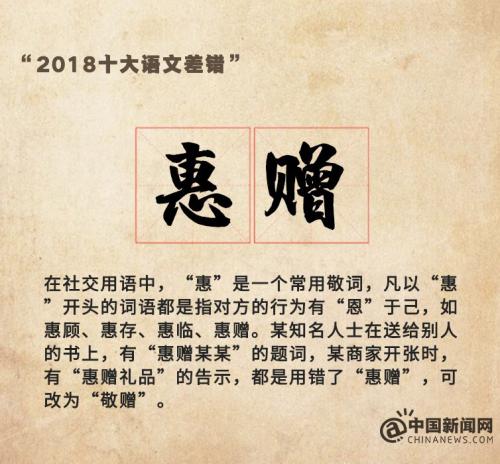2018 ten major language errors announced, these words are easy to misread and use
On December 26, the reporter learned from the editorial department of "Biting Words" that the "2018 Top Ten Language Mistakes" were officially announced, including mistaking "favor" for "favor" and "hà o" for "hà o".
Perhaps, these words that are easy to mispronounce and misuse will also come across in your life. Have you ever made these mistakes?
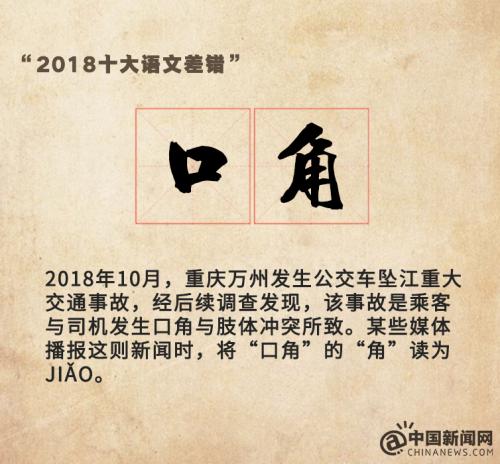
1. Pronunciation error in the report of the Chongqing bus falling into the river: the "angle" of the "quarrel" is misread as jio.
In October 2018, a bus crashed into a river in Wanzhou, Chongqing. After a follow-up investigation, it was found that the accident was caused by an altercation and physical conflict between passengers and drivers. When some media reported the news, the "angle" of the "altercation" was read as jio.
"Horn" is a polyphonic word with two pronunciations, jio and jué. When reading jio, it refers to the long, pointed bony protrusions that grow on the heads of animals such as cattle and sheep, and also refers to the place where the two edges of the object meet. When reading jué, there is a sense of contest, competition, and competition. Passengers and drivers have a "spat", that is, a verbal contest, and "horn" should be read jué.
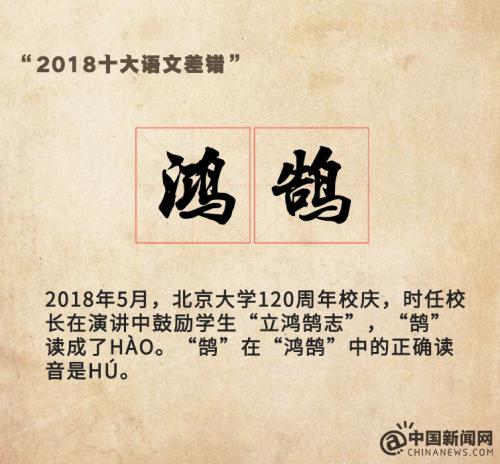
Second, the pronunciation error in the college celebration speech: the "Hu" of "Honghu" is misread as hà o
In May 2018, during the 120th anniversary celebration of Peking University, the then president encouraged students to "establish great ambitions" in a speech, and "hu" was pronounced hà o.
The correct pronunciation of "Hu" in "Honghu" is hú. "Honghu" is commonly known as a swan. Because of its good flying, people often use "Honghu Zhi" as a metaphor for lofty ambitions.
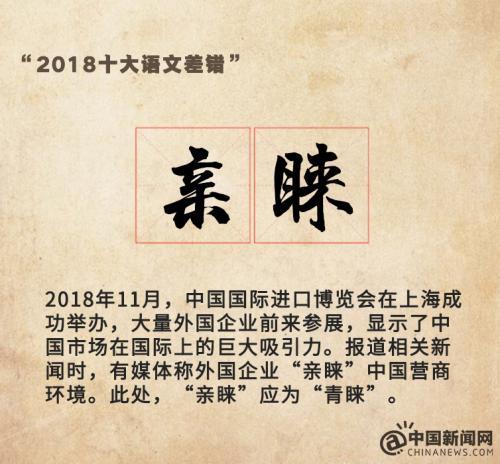
III. Wrong wording in the "Import Expo" report: "favor" is mistaken for "favor"
In November 2018, the China International Import Expo was successfully held in Shanghai, and a large number of foreign companies came to participate in the exhibition, showing the great attractiveness of the Chinese market in the world. When reporting related news, some media said that foreign companies "favor" China’s business environment.
Here, "pro-favor" should mean "favor", which refers to Ruan Ji, a famous figure in the Three Kingdoms period. Ruan often looks at people with "green and white eyes". Those who like it look at people with black eyes, and those who don’t like it look at them with white eyes. "Green" refers to black eyes, and "favor" means to look at.
IV. Wording errors in reports on the entertainment industry: "making a mess" is mistaken for "making a mess"
Since May 2018, Cui Yongyuan has been using Weibo to expose "unspoken rules" such as "yin and yang contracts" in the entertainment industry, which has attracted the attention and investigation of relevant departments. Some online media have said that Cui Yongyuan has "stabbed a basket", and once the black curtain in the entertainment industry is lifted, it will set off a "monstrous wave". "Stabbing a basket" should be "making a mess".
Lou, originally referring to the hollow object, "making a mess" is to poke a loophole, which is often compared to causing chaos, disputes, disasters, etc. "Basket" is a container made of bamboo strips, thorns, iron wires, etc. There is no such thing as "making a basket".
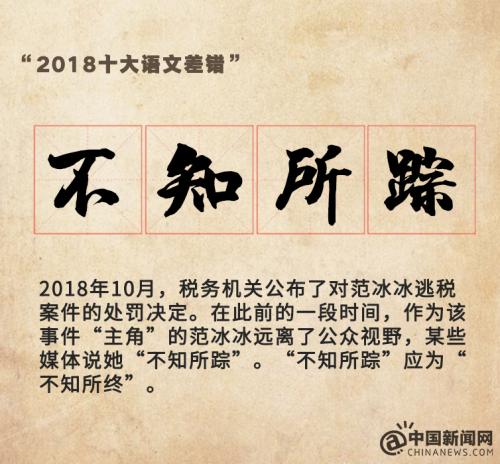
5. Wrong wording in Fan Bingbing’s tax evasion report: "unknown" mistaken for "missing"
In October 2018, the tax authorities announced the punishment for Fan Bingbing’s tax evasion case. Some time ago, Fan Bingbing, the "protagonist" of the incident, was out of the public eye, and some media said she was "missing". "Missing" should be "missing".
"End" is a verb that refers to termination and end. "End" is a "all" word structure. The structural auxiliary word "all" plus the verb "end" form a noun component and act as an "unknown" object. "Trace" is a trace, it is a noun, and cannot be matched with the word "all".
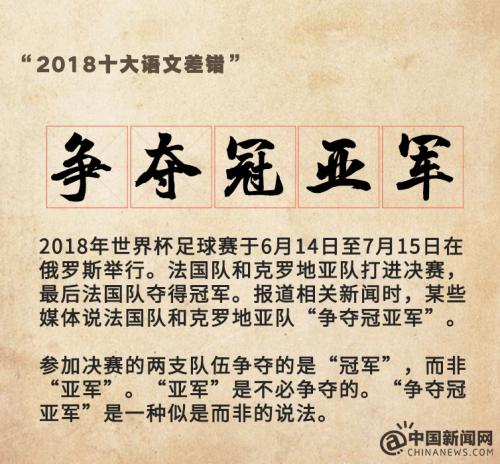
Inappropriate expressions in World Cup coverage: "Competing for the championship and runner-up"
The 2018 FIFA World Cup was held in Russia from June 14 to July 15. France and Croatia advanced to the final, and the French team finally won the championship. When reporting related news, some media said that France and Croatia were "competing for the championship and runner-up."
The two teams competing in the final are competing for the "championship", not the "runner-up". "Runner-up" does not have to be contested. "Competing for championship and runner-up" is a specious term.
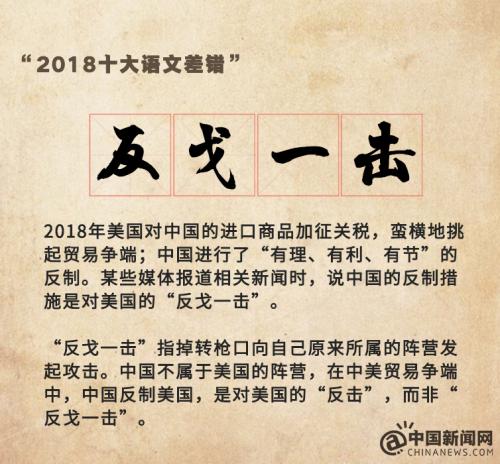
Misuse of words in reports on the Sino-US trade dispute: "counterattack" mistaken for "counterattack"
In 2018, the United States imposed tariffs on Chinese imports, arrogantly provoking trade disputes; China carried out "reasonable, favorable and restrained" countermeasures. When some media reported relevant news, they said that China’s countermeasures were a "counter-attack" against the United States.
"Counterattack" refers to turning the gun and launching an attack on the camp to which one belongs. China is not in the camp of the United States. In the Sino-US trade dispute, China’s counter-attack against the United States is a "counterattack" against the United States, not a "counterattack".
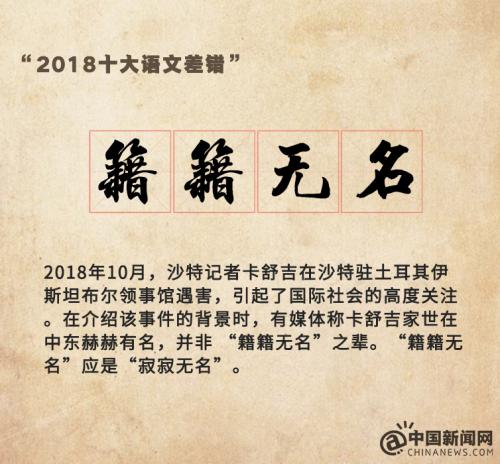
Eight, the typographical error in the report on the killing of the Saudi journalist: "unknown origin"
In October 2018, the killing of Saudi journalist Khashoggi in the Saudi consulate in Istanbul, Turkey, attracted great attention from the international community. When introducing the background of the incident, some media said that Khashoggi’s family was famous in the Middle East, not "unknown". "Nameless" should be "unknown"
The word "nationality" in Chinese often describes a great reputation; "nationality is nameless" is logically unreasonable.
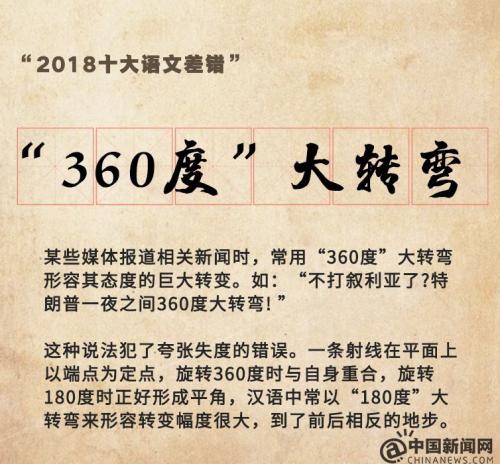
Rhetorical errors in international relations reporting: a "360-degree" U-turn
US President Trump’s attitude is capricious when dealing with some major international issues. When some media report relevant news, they often use a "360-degree" U-turn to describe their huge change of attitude. For example: "Stop fighting Syria? Trump made a 360-degree U-turn overnight!"
This statement made the mistake of exaggerating the loss of degree. A ray on the plane is fixed at the end point, and when it rotates 360 degrees, it coincides with itself, and when it rotates 180 degrees, it just forms a flat angle. In Chinese, a "180-degree" turn is often used to describe a large change, to the point where the front and rear are reversed.(Reporter, Shangguan Yun)
